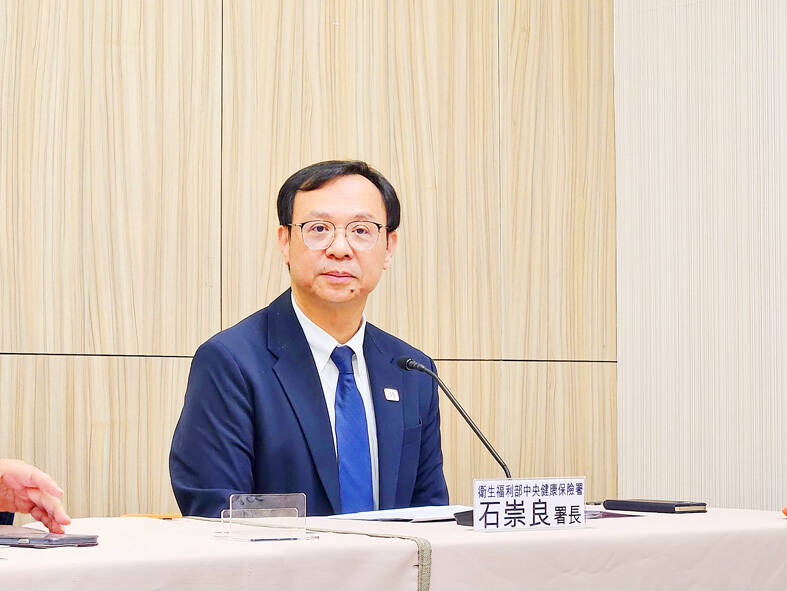US President Donald Trump’s tariffs could potentially compromise Taiwan’s access to affordable US-made medical drugs that have no generic alternatives, a top health official told lawmakers yesterday.
Taiwan sources 176 medical drugs from the US, including 72 key, life-saving medicines that cannot be replaced due to restrictions on patented formulae, National Health Insurance Administration Director-General Shih Chung-liang (石崇良) said at a meeting at the Legislative Yuan in Taipei.
He made the comments in response to expressions of concern from lawmakers that Washington’s tariffs on pharmaceutical chemical importers could raise the cost of US-made drugs that Taiwan depends on.

Photo: CNA
Speaking about the state of Taiwan’s medical imports, Shih said a rise in pharmaceutical costs would negatively impact Taiwanese, as the National Health Insurance (NHI) does not cover many crucial drugs made in the US.
The critical medical drugs whose costs might see steep increases include 24 drugs needed by people with cancer or who are immunocompromised and 18 drugs used for hematological conditions or infections, he said.
Taiwan also imports three types of medical equipment from the US that are rarely used, but nearly impossible to replace, he said.
The nation buys 83 percent of NHI-covered drugs from domestic sources and imports most of its foreign-made drugs from Europe, but the US exerts control over many types of hard-to-replace cancer drugs, he said.
US entities own 214 certificates for manufacturing medical drugs and equipment in Taiwan, including 60 that cover a product with an active patent, he said.
The government does not foresee drug shortages in the immediate future and is implementing measures to create a reserve of medicines in case of disruption to supply chains, Minister of Health and Welfare Chiu Tai-yuan (邱泰源) said.

Taiwanese can file complaints with the Tourism Administration to report travel agencies if their activities caused termination of a person’s citizenship, Mainland Affairs Council Minister Chiu Chui-cheng (邱垂正) said yesterday, after a podcaster highlighted a case in which a person’s citizenship was canceled for receiving a single-use Chinese passport to enter Russia. The council is aware of incidents in which people who signed up through Chinese travel agencies for tours of Russia were told they could obtain Russian visas and fast-track border clearance, Chiu told reporters on the sidelines of an event in Taipei. However, the travel agencies actually applied

New measures aimed at making Taiwan more attractive to foreign professionals came into effect this month, the National Development Council said yesterday. Among the changes, international students at Taiwanese universities would be able to work in Taiwan without a work permit in the two years after they graduate, explainer materials provided by the council said. In addition, foreign nationals who graduated from one of the world’s top 200 universities within the past five years can also apply for a two-year open work permit. Previously, those graduates would have needed to apply for a work permit using point-based criteria or have a Taiwanese company

The Shilin District Prosecutors’ Office yesterday indicted two Taiwanese and issued a wanted notice for Pete Liu (劉作虎), founder of Shenzhen-based smartphone manufacturer OnePlus Technology Co (萬普拉斯科技), for allegedly contravening the Act Governing Relations Between the People of the Taiwan Area and the Mainland Area (臺灣地區與大陸地區人民關係條例) by poaching 70 engineers in Taiwan. Liu allegedly traveled to Taiwan at the end of 2014 and met with a Taiwanese man surnamed Lin (林) to discuss establishing a mobile software research and development (R&D) team in Taiwan, prosecutors said. Without approval from the government, Lin, following Liu’s instructions, recruited more than 70 software

Taiwanese singer Jay Chou (周杰倫) plans to take to the courts of the Australian Open for the first time as a competitor in the high-stakes 1 Point Slam. The Australian Open yesterday afternoon announced the news on its official Instagram account, welcoming Chou — who celebrates his 47th birthday on Sunday — to the star-studded lineup of the tournament’s signature warm-up event. “From being the King of Mandarin Pop filling stadiums with his music to being Kato from The Green Hornet and now shifting focus to being a dedicated tennis player — welcome @jaychou to the 1 Point Slam and #AusOpen,” the